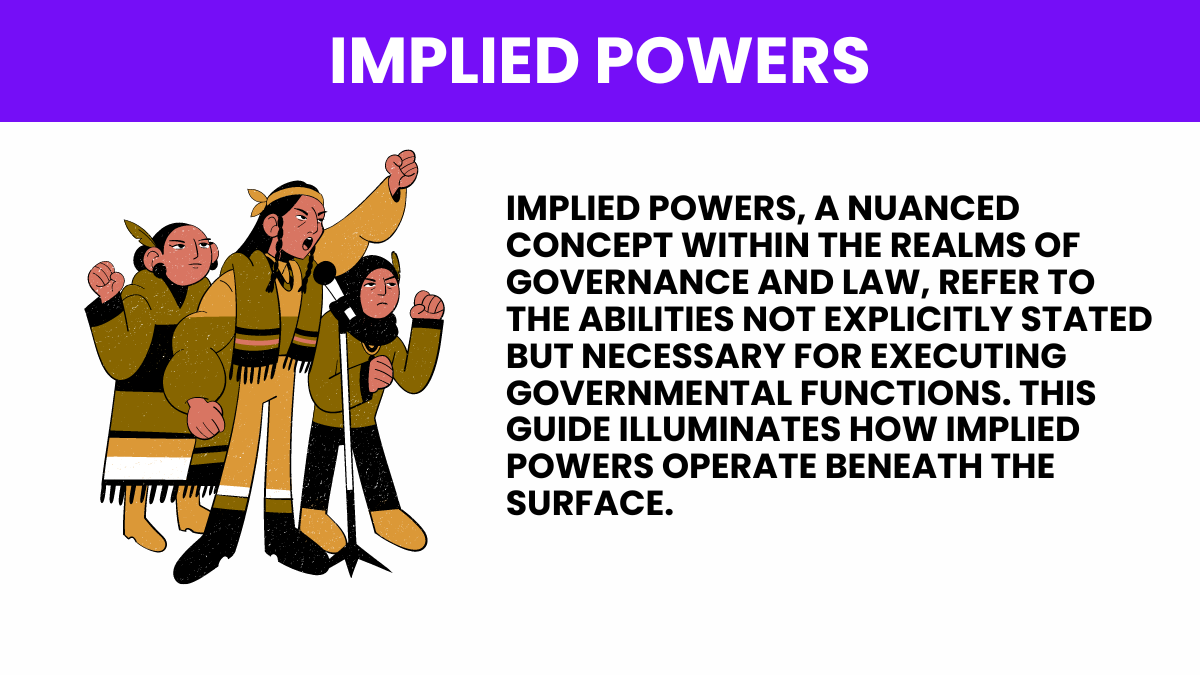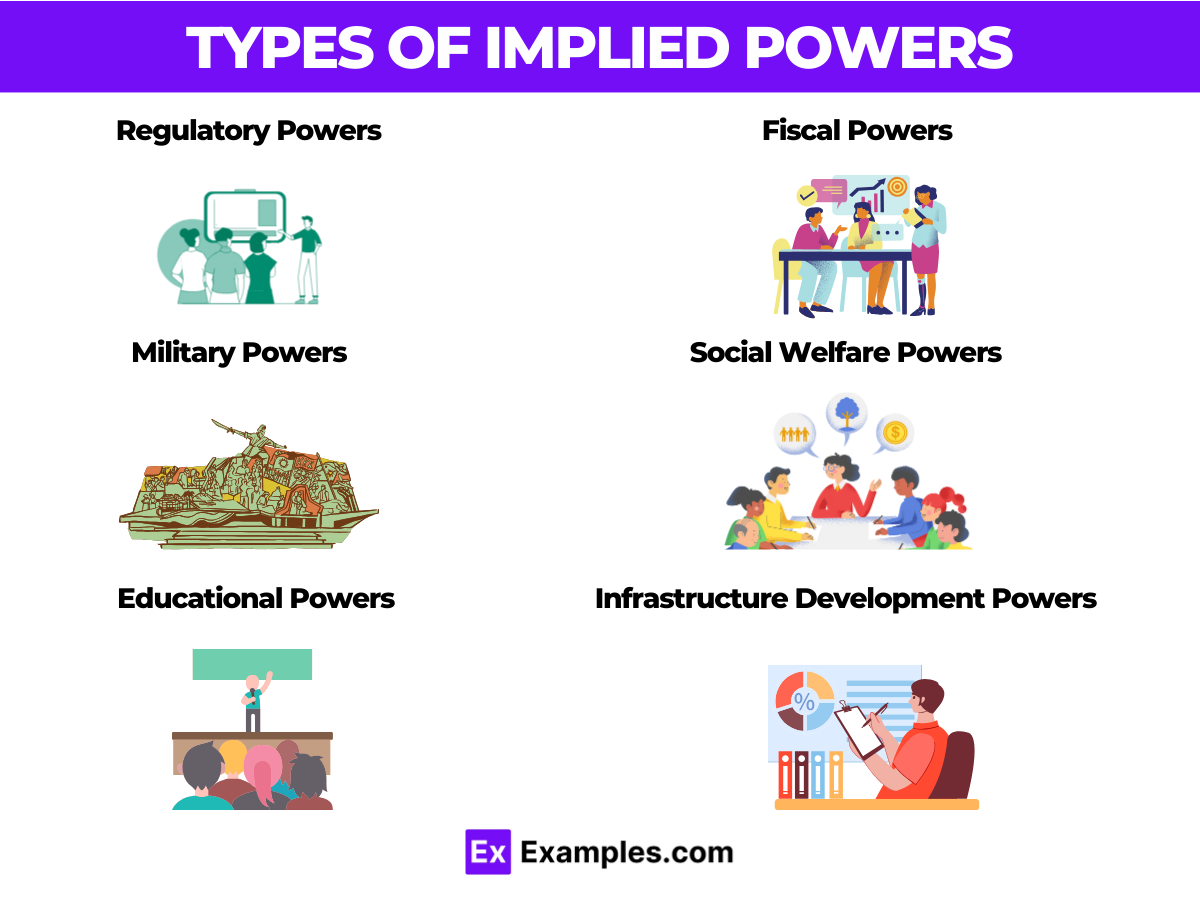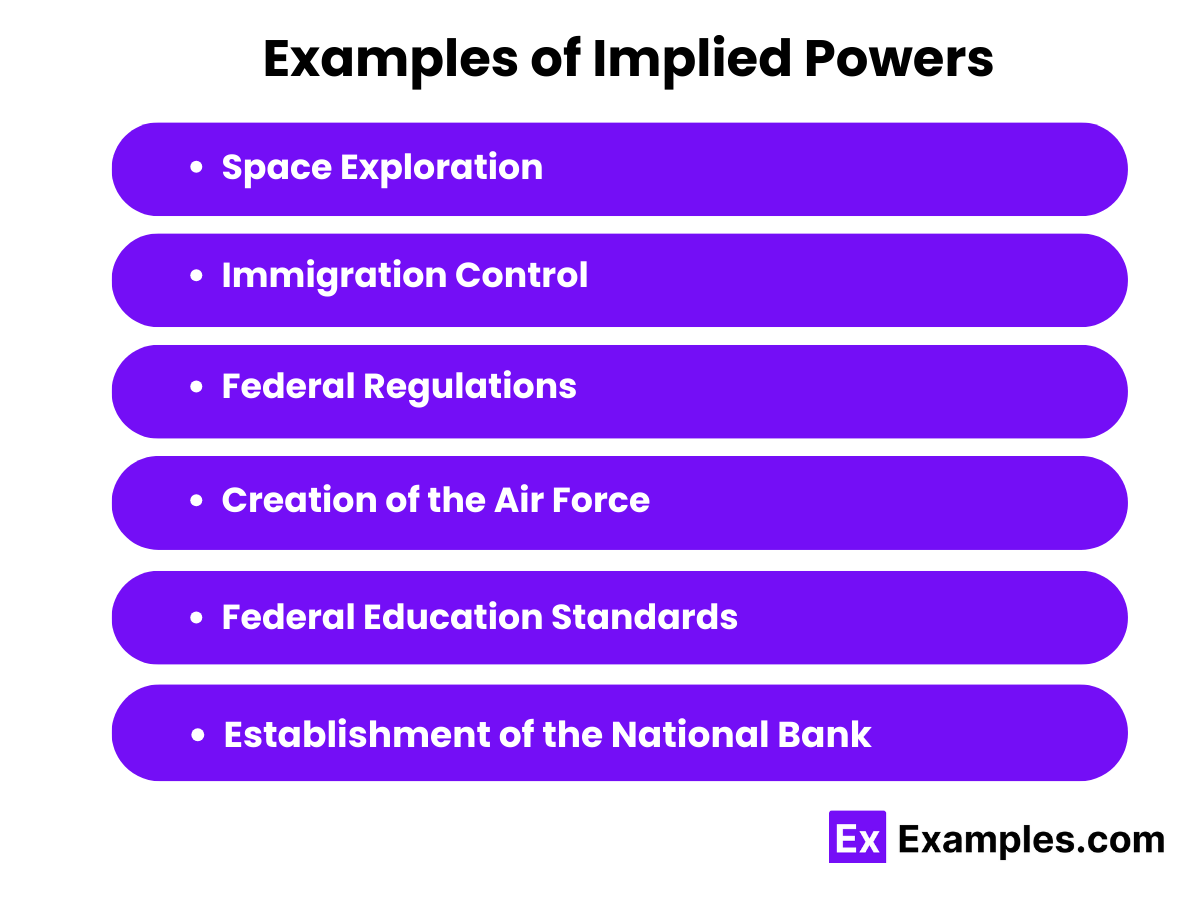10+ Implied Powers Examples
Implied powers, a nuanced concept within the realms of governance and law, refer to the abilities not explicitly stated but necessary for executing governmental functions. This guide illuminates how implied powers operate beneath the surface, extending the reach of authority in ways not directly outlined in statutes or constitutions. By examining historical and contemporary examples, we reveal their pivotal role in shaping policies and decisions. The interplay between implied powers and imperialism showcases the evolution of political strategies and the enduring impact on global dynamics. Delve into this comprehensive exploration to understand the subtleties and significance of implied powers in shaping our world.
What are Implied Powers?
Implied powers are the abilities not explicitly mentioned in a constitution or legal document but are considered necessary for a governing body to fulfill its duties. These powers are derived from the authority given by the constitution, allowing governments to take actions needed to effectively govern and meet their responsibilities. Implied powers ensure flexibility and adaptability in governance, enabling authorities to address issues and situations that the framers of the constitution could not foresee.
Types of Implied Powers
- Regulatory Powers: Governments use implied powers to regulate industries, the economy, and various aspects of society.
- The U.S. Environmental Protection Agency (EPA) enforces environmental standards and regulations to protect air and water quality.
- The Federal Reserve regulates banks, controls monetary policy, and aims to maintain financial stability in the United States.
- Fiscal Powers: Implied powers allow for the creation and collection of taxes, borrowing of funds, and other financial mechanisms necessary to support government operations and projects.
- The U.S. government collects income taxes based on the Sixteenth Amendment, using these funds for national projects and services.
- Governments borrow money by issuing bonds to finance public projects like infrastructure development and to manage national debt.
- Military Powers: Beyond declared powers, governments may use implied powers to engage in actions necessary for national defense and security
- The United States has established military bases worldwide, such as in Germany and Japan, to support global security interests.
- Drone warfare, used by several countries, operates under implied powers for national defense without explicit constitutional mention.
- Social Welfare Powers: These include the ability to enact policies and programs that promote the health, safety, and well-being of the population, such as social security systems and public health initiatives.
- The introduction of the Affordable Care Act (ACA) in the United States aimed to extend healthcare coverage to more citizens.
- Social security systems provide financial assistance to the elderly, disabled, and survivors, ensuring their welfare.
- Educational Powers: Through implied powers, governments have the authority to establish and regulate public education systems, set educational standards, and implement policies aimed at improving the quality of education.
- Federal laws like the Every Student Succeeds Act (ESSA) in the United States set educational standards and accountability for states.
- Governments fund and regulate public universities, setting standards for higher education and ensuring access to quality education.
- Infrastructure Development Powers: Implied powers also extend to the development and maintenance of national infrastructure. This includes the construction of roads, bridges, public transportation systems, and utilities.
- The Interstate Highway System in the United States was developed to improve national defense and promote economic growth.
- Public transportation projects, like the London Underground in the UK, receive government funding and regulation to enhance urban mobility.
Examples of Implied Powers
- Establishment of the National Bank: A classic example of implied powers in action, the establishment of the National Bank was argued by Alexander Hamilton to be necessary for managing the nation’s finances, despite no explicit constitutional provision for such an institution.
- Creation of the Air Force: Though the Constitution mentions an army and navy, it does not explicitly mention an air force. The creation of the U.S. Air Force as part of the national defense is justified through implied powers.
- Federal Regulations: The federal government’s ability to regulate areas like the internet, environmental protection, and consumer safety, though not specifically mentioned in the Constitution, are examples of implied powers in modern governance.
- Immigration Control: While the U.S. Constitution does not explicitly grant the federal government the power to regulate immigration, this authority is derived from its powers over foreign affairs and national defense. The federal government’s role in controlling who enters and leaves the country showcases implied powers at work, ensuring the nation can respond to changing demographic and security challenges.
- Federal Education Standards: The Department of Education sets standards and policies for educational institutions across the nation, even though the Constitution doesn’t specifically mention education. This is an exercise of implied powers, rooted in the government’s responsibility to promote the general welfare and ensure an educated populace for the country’s future.
- Space Exploration: The creation and operation of NASA (National Aeronautics and Space Administration) for space exploration and research are based on implied powers. The Constitution does not explicitly mention space exploration, but this authority stems from the government’s power to promote scientific advancement and national defense.
History of Implied Powers
Implied powers emerged from the interpretation of the U.S. Constitution, notably through the Necessary and Proper Clause. This clause grants Congress the authority to pass all laws necessary and proper for executing its enumerated powers. The debate over the extent of these powers was a central theme in early American political discourse, epitomized by the contrasting views of Alexander Hamilton, who advocated for broad federal authority, and Thomas Jefferson, who championed a more constrained interpretation. The landmark Supreme Court case McCulloch v. Maryland (1819) affirmed the doctrine of implied powers, establishing a precedent for federal authority to undertake actions not explicitly stated in the Constitution, provided they are in pursuit of its enumerated powers.
- Clear Judicial Oversight: Establishing robust mechanisms for judicial review to ensure that actions taken under the guise of implied powers are indeed necessary and proper.
- Legislative Clarity: Encouraging detailed legislation that specifies the extent and limits of implied powers to minimize ambiguity and potential misuse.
- Public Engagement and Education: Enhancing public understanding of constitutional principles to foster an informed populace that can hold their government accountable.
- Regulation of Commerce: The federal government’s power to regulate interstate commerce has been broadly interpreted to include various economic activities, affecting labor laws, environmental regulations, and the digital economy.
- Civil Rights Legislation: The passage of civil rights laws, including those prohibiting racial discrimination in voting, employment, and public accommodations, has been justified through implied powers, particularly under the Commerce Clause and the Fourteenth Amendment.
FAQS
What are implied powers in India?
Implied powers in India refer to those authorities not explicitly stated in the Constitution but deemed necessary for executing governmental functions effectively.
How are enumerated and implied powers similar?
Enumerated and implied powers are similar as both are essential for governance; enumerated powers are expressly listed, while implied powers are assumed to exist for the government to perform its duties.
What is implied limitation?
Implied limitation refers to unstated restrictions within legal or constitutional frameworks that limit the scope of governmental power or individual rights.
Our exploration of the table of implied powers reveals the intricate balance between explicit authority and the necessary flexibility within governance. These powers, though not explicitly stated, are essential for the effective functioning of institutions, enabling them to adapt and respond to unforeseen challenges. Understanding implied powers is crucial for appreciating the depth and dynamism of constitutional and organizational frameworks.




